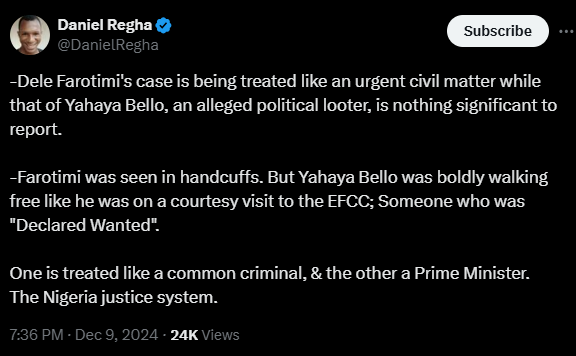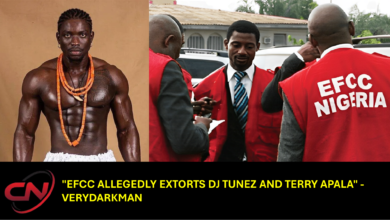Daniel Regha on the Treatment of Dele Farotimi and Yahaya Bello

Daniel Regha emphasized on X (formerly Twitter) what seems to be disparities in handling those perceived to have committed those offenses under Nigerian law. Regha observed, “Dele Farotimi’s case is treated as one of those urgent civil matters, while that of Yahaya Bello is next to nothing to report.” He pointed at Farotimi, being taken to court in handcuffs, while Yahaya Bello, who had been declared wanted by the EFCC over alleged corruption and embezzlement of N80.2 billion, was allowed to walk the streets free, on a supposed “courtesy visit.”
Advertisements
In his words,
-Dele Farotimi’s case is being treated like an urgent civil matter while that of Yahaya Bello, an alleged political looter, is nothing significant to report.
-Farotimi was seen in handcuffs. But Yahaya Bello was boldly walking free like he was on a courtesy visit to the EFCC; Someone who was “Declared Wanted”.
One is treated like a common criminal, & the other a Prime Minister.
The Nigeria justice system.

Farotimi, a lawyer and social activist, was charged with offenses relating to computer crime, which many commentators felt was disproportionate. Bello, who served earlier as the governor of Kogi State, has been investigated for widespread fraud involving financial crimes. The EFCC arrested Bello on charges of money laundering and embezzlement but released his co-accused on bail. Bello, represented by counsel, denied the accusation leveled against him, arguing that he had abided by all procedures before the court in arguing for bail pending his ruling.
These seeming double standards have revived debates among the public about systemic inequities in the judiciary of the country. Critics, which Regha belongs to, point towards a justice system that does leniently with the elite and those politically connected, while the common citizen or activist faces severe sentences on lesser charges. “Treat one like a common criminal & the other like a Prime Minister. The Nigeria justice system,” said Regha.
The discussion extended online, where several users expressed their frustration. “It’s amazing how some people get the VIP treatment while others are treated like common criminals,” @Johnnyharrt wrote. Similarly, @MikeEtim11 tweeted: “Welcome to Nigeria where criminals are celebrated, and activists are jailed.”
Others like @Kodead777 just saw it as symptomatic of more general ills in society: “A govt dat celebrates thieves will definitely “comprehensively” blossom in corruption! The revolution starts wif us, d citizens!” Yet @AliUthman12 declared, “The Nigeria justice system is dead.” This has led to a hue and cry by the public, expressing dissatisfaction with the larger frameworks of governance and judicature in Nigeria. Many had hoped that the country would move toward reforms to ensure fairness and accountability so that everyone is equal before the law. For now, the cases of both Dele Farotimi and Yahaya Bello remain polemical precedents in the troubled judiciary of Nigeria.









